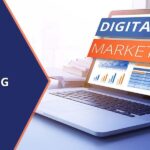In today’s hyper-connected world,
is no longer optional—it’s essential. Businesses of every size are using online strategies to connect with their audience, build trust, and drive sales. Whether you’re running a small local shop or a global brand, understanding digital marketing is key to staying ahead.
In this guide, we’ll explore what digital marketing really means, how it works, and how online advertising fits into the bigger picture. You’ll also learn the latest trends for 2025 so you can create strategies that deliver real results.
What Is Digital Marketing?
Digital marketing is the process of promoting products, services, or brands using online channels. It combines creativity, strategy, and technology to reach people where they spend most of their time—on the internet.
The main areas of digital marketing include:
-
Search Engine Optimization (SEO) – improving website visibility on Google and other search engines.
-
Social Media Marketing – promoting content and engaging with audiences on platforms like Instagram, Facebook, TikTok, and LinkedIn.
-
Content Marketing – creating valuable articles, videos, and other media to attract and engage customers.
-
Email Marketing – sending personalized messages to nurture leads and retain customers.
-
Online Advertising – running paid campaigns on Google, YouTube, and social media platforms.
Why Digital Marketing Matters in 2025
With technology evolving at lightning speed, consumer behavior has shifted dramatically. People search for everything online before making decisions—whether it’s buying a product, hiring a service, or booking an appointment.
Here’s why digital marketing is more important than ever:
-
Global Reach – You can target customers across the world without opening a physical store.
-
Cost-Effective – Compared to traditional ads, online advertising offers precise targeting with a better return on investment.
-
Measurable Results – Every click, view, and conversion can be tracked in real-time.
-
Personalization – You can tailor messages for different audiences, making marketing more relevant and effective.
Digital Marketing vs. Online Advertising
While digital marketing is the umbrella term for all online promotional activities, online advertising is a specific part of it.
-
Digital Marketing: Includes SEO, content marketing, social media engagement, email marketing, influencer marketing, and more.
-
Online Advertising: Focuses on paid campaigns, such as Google Ads, Facebook Ads, and sponsored content.
Both work best when used together—organic strategies build trust and authority, while paid ads drive quick traffic and conversions.
The Core Components of Digital Marketing
1. Search Engine Optimization (SEO)
SEO helps your website appear higher in search results. This involves keyword research, content optimization, and building backlinks.
2. Content Marketing
Quality content builds relationships and positions you as an expert. This could be blog posts, videos, infographics, or podcasts.
3. Social Media Marketing
Social platforms are great for increasing brand awareness and engaging directly with customers.
4. Email Marketing
Still one of the highest ROI channels, email helps nurture leads into paying customers.
5. Pay-Per-Click (PPC) Advertising
A major form of online advertising, PPC allows you to target specific keywords and audiences for immediate visibility.
Trends Shaping Digital Marketing in 2025
To stay competitive, you need to understand the latest trends:
-
AI-Powered Campaigns – Artificial intelligence is helping marketers analyze data faster and personalize content better.
-
Voice Search Optimization – With smart speakers rising in popularity, optimizing for voice queries is essential.
-
Short-Form Video – Platforms like TikTok and Instagram Reels continue to dominate.
-
Privacy-Focused Marketing – With stricter data laws, businesses are focusing on transparency and consent-based marketing.
-
Interactive Content – Quizzes, polls, and interactive videos are increasing engagement.
SEO and Digital Marketing: The Winning Combination
SEO is the foundation of successful digital marketing. Without it, your content may never reach your audience. When combined with targeted online advertising, you create a balanced strategy that drives both long-term and short-term results.
For example:
-
SEO brings in organic traffic over time.
-
PPC ads bring in immediate clicks while SEO builds momentum.
Tips for a Successful Digital Marketing Strategy
-
Know Your Audience – Understand their needs, preferences, and behaviors.
-
Mix Organic and Paid Methods – Combine SEO with online advertising for the best results.
-
Create Valuable Content – Give your audience solutions, not just promotions.
-
Track and Analyze – Use analytics tools to measure performance and adjust your campaigns.
-
Stay Updated – Digital trends change fast, so keep learning and adapting.
Conclusion
In 2025, digital marketing is about more than just being online—it’s about being relevant, engaging, and strategic. Whether you focus on SEO, social media, or online advertising, the key is to deliver value and build trust with your audience.
By combining organic growth with targeted paid campaigns, you can reach more people, generate more leads, and grow your business sustainably. In short, digital marketing is your pathway to success in the modern marketplace.
FAQs
Q: Is digital marketing suitable for small businesses?
A: Absolutely. It’s cost-effective and scalable, making it perfect for small and medium businesses.
Q: How quickly can I see results from digital marketing?
A: Paid ads can bring results instantly, while SEO and content strategies take time—usually 3–6 months.
Q: Do I need a big budget for online advertising?
A: Not necessarily. Even small budgets can work if campaigns are well-targeted and optimized.






